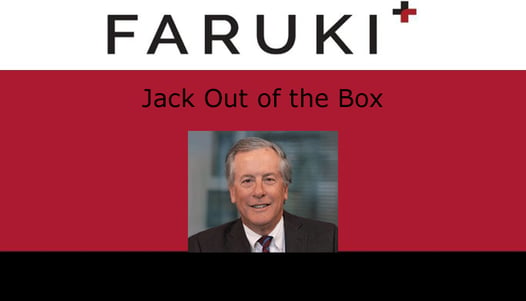- April 1, 2025
- Jack Greiner
- Jack Out of the Box
 I went to law school for several reasons. For one, I wasn't smart enough to get into medical school. Second, I was (still am) terrible with numbers. Third, TV lawyers like Perry Mason, Clinton Judd and Owen Marshall seemed really cool.
I went to law school for several reasons. For one, I wasn't smart enough to get into medical school. Second, I was (still am) terrible with numbers. Third, TV lawyers like Perry Mason, Clinton Judd and Owen Marshall seemed really cool.
But a primary reason for my decision was a book I read in college entitled "Clarence Darrow for the Defense" by Irving Stone. Darrow was raised in Kinsman Ohio. He did not graduate from law school, but passed the bar after a period of self-study. He would go on to litigate some of the most high-profile cases of the 20th century. Among his clients were union activist Eugene Debs, Nathan Leopold Jr. and Richard Loeb, who confessed to the murder of 14-year-old Billy Franks, and John Scopes, a Tennessee teacher charged with teaching the theory of evolution.
The general public despised many of Darrow's clients. No doubt, many came to despise Darrow himself. But the idea of defending the least popular among us inspired me. But what inspired me more was the notion that as a country, the United States recognized that even the "worst of the worst" had the right to counsel. The Fifth Amendment guarantees the right to "due process" and the Sixth Amendment guarantees criminal defendants the right to counsel. In 1963, the United States Supreme Court guaranteed the right to counsel even to those who could not afford it. I always took it for granted that people recognized that lawyers can and should take on unpopular cases. Now, I'm not so sure.
Over the last month, President Trump has issued executive orders targeting seven different law firms. The orders typically revoke security clearances for lawyers employed by the firms, limit the firms' attorneys' access to federal buildings, and require federal agencies to review and terminate contracts with the targeted firms. The reason for the executive orders is that lawyers at the targeted firms represented Hilary Clinton, or participated in Robert Mueller's special investigation or worked with Jack Smith. In other words, the firms represented causes and litigants who President Trump doesn't like.
Two of the targeted firms – Wilmer Hale and Skadden Arps capitulated and entered agreements to provide pro bono services to causes President Trump favors. In entering the agreement, a spokesman for the Paul Weis firm noted that even if it were to successfully challenge the order in court, it would be deemed an enemy of the administration, likely causing clients to leave, and bankrupt the firm.
Fortunately, the other five firms – Perkins Coie, Covington & Burling, Elias Law Group, Jenner & Block and Wilmer Hale – have fought back. Perkins Coie filed a federal lawsuit, and the judge in that case has blocked enforcement of part of the order. Jenner & Block also filed suit and on March 28, Judge John D. Bates of the US District Court for the District of Columbia issued a temporary restraining order that keeps the Trump administration from taking action against the firm.
The concern here is not only with the fate of the targeted firms (and by the time this runs there may be more) but with the effect of President Trump's action. Will law firms with the resources to represent clients with legitimate cases against the administration be deterred from taking on those cases based on what's happened to the targeted firms? And if so, will those claims ever see the light of day?
Our founding fathers walked the walk on this concept. John Adams represented British soldiers in the Boston Massacre trial. Alexander Hamilton represented British loyalists who sued to recover their property confiscated during the Revolutionary War. The ability of lawyers to represent unpopular clients helps make this country great. It is fundamental to our liberty. But the Trump executive orders are a direct assault on that liberty. And stripping our basic freedoms in no way makes America great again.
